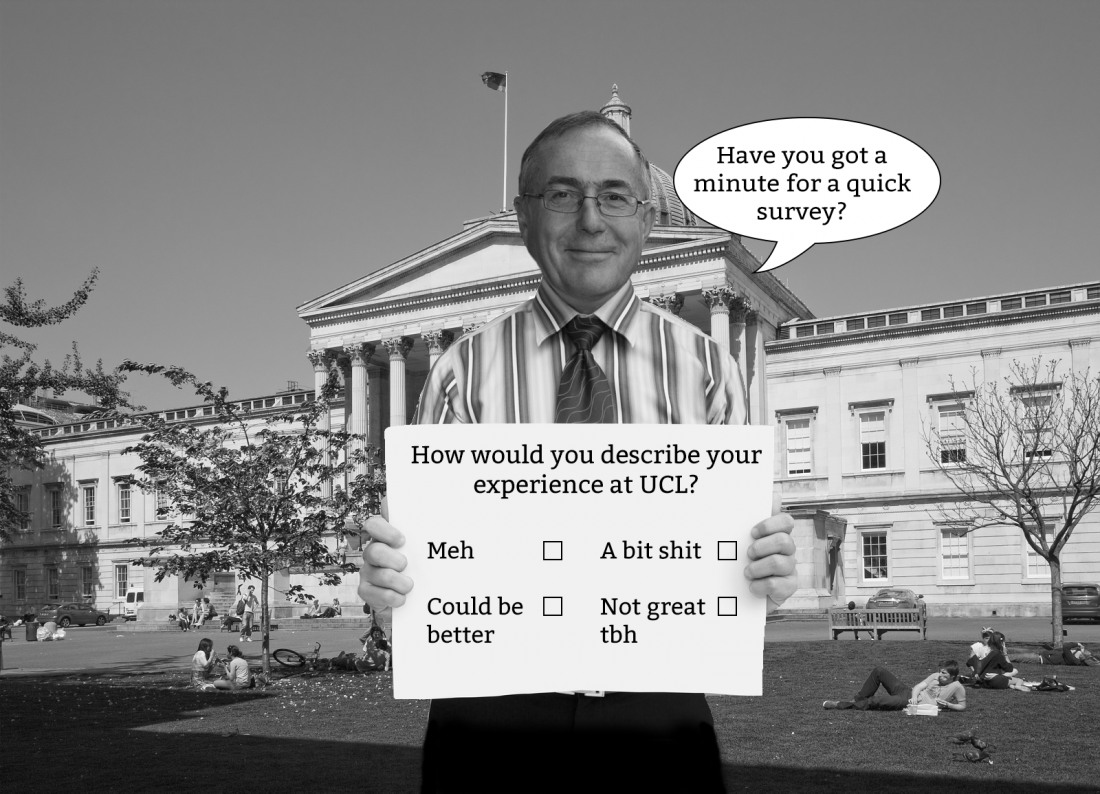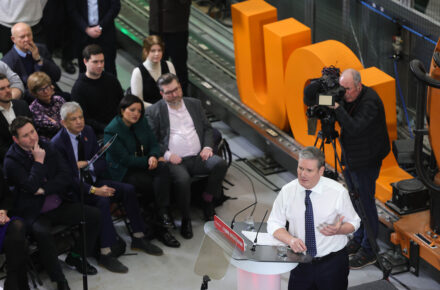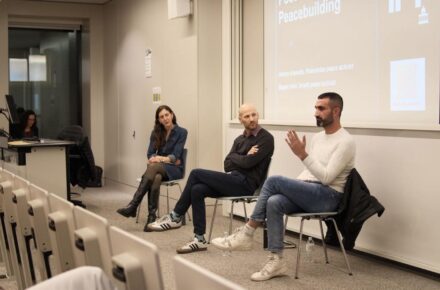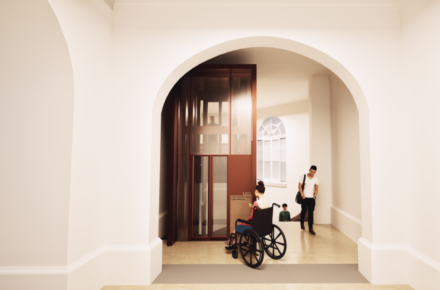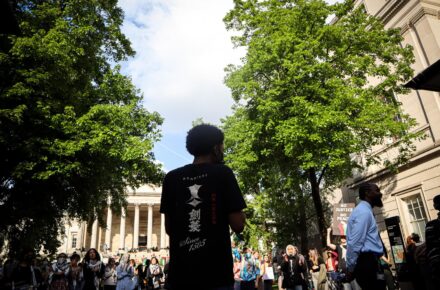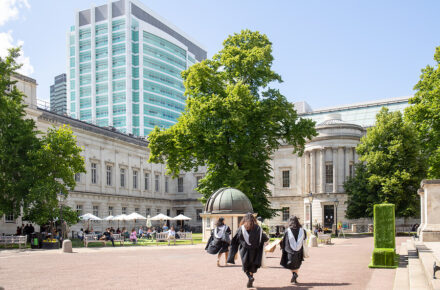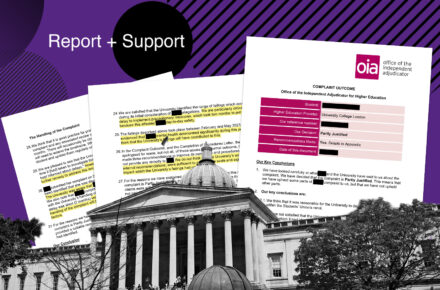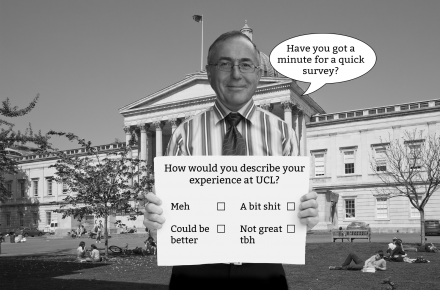
If you’ve seen the six foot tall billboards around UCL encouraging final year students to take part in the National Student Survey (NSS), you might think it’s commendable for UCL to come down from the Portico steps to ask us what we really think. In reality though it’s a pain in the arse that management could do without, and it’s simply highlighting how poor the teaching and student experience is, especially compared to other Russell Group universities. Unfortunately for College bigwigs, what we say in the NSS is about to become crucial in putting food on the table.
UCL has long relied on a steady stream of research funding and international students with deep pockets, but now the below-par student experience could really cost the university. Government’s recent higher education green paper outlined the Teaching Excellence framework, which uses the NSS to judge teaching quality. Only institutions deemed ‘excellent’ by the framework will be allowed to raise tuition fees in line with inflation from 2017-18. Last year UCL fared poorly in the survey, scoring just 83% for student satisfaction, below the national average and down on previous years. At the time Professor Anthony Smith, Vice Provost Education & Student Affairs, said “it is obviously of concern that overall satisfaction has dropped. We take these results extremely seriously, are looking closely at
the details and will listen carefully to the issues raised.” In reality, however, the student experience at UCL has been neglected for a long time, and it’ll take more than earnest reassurances to reverse the trend.
One of the reasons for a drop in student experience is the ballooning student intake every year, putting pressure on departments to deliver a high level of teaching with increasingly stretched resources. Today the number of students stands at 38,313, a leap of 43% compared to 2012, yet UCL is still expected to ask all departments to reduce their costs by 10% in the coming months in an attempt to boost their cash reserves.
Also fuelling the dissatisfaction are the unreasonable expectations placed on postgraduate teaching assistants. Many PGTAs use teaching to help fund their studies, but the rewards are often low compared to the workload. Harry Stopes, a PhD student at UCL and postgraduate representative for teachers’ union UCU, said that PGTAs are paid a fixed number of hours for each course they teach, but that this rarely covers the amount of work required to adequately prepare for and teach the course.
According to Stopes, “it’s normal for teaching assistants to go the extra mile and give undergraduates the best experience possible, but this inevitably means working for longer hours than you get paid.” A survey conducted last year by UCL Fair Pay for TAs found that on average 40% of the hours worked are unpaid. It’s true that this problem is far from unique to UCL, and many universities have similar issues. Despite this, it’s difficult to imagine how student experience will improve while academic staff are under such pressures.
Another persistent ball-ache for students is the inadequacy of UCL’s buildings and facilities, meaning lectures often end up in cramped seminar rooms, with students failing to find spaces to study and some even complaining of having to sit on the floor in classes. This was addressed by UCL in its response to last year’s survey results. Mentioning “significant and urgent changes to the teaching estate”, management promised “We’ll also be looking at the quality of our learning spaces, to ensure they are welcoming, comfortable and conducive to learning.”
Major projects such as the new student centre aren’t due to open for several years, however, and UCL’s slow creep out of Bloomsbury and towards east London (CG 47) is progressing at an agonising pace. Instead, inadequate and inefficient stop gaps have been set up to appease students. A ‘pop-up learning hub’ (read: portacabin) has been set up in the south quad, to the chagrin of staff and students alike and at a cost of nearly a million pounds. The UCL Senate House hub does offer much needed study space, although at a cost of more than five million pounds over ten years, temporary improvements like these are pricey options. The way UCL Estates has handled the Bloomsbury Theatre debacle can’t instil much hope in students for a reborn Bloomsbury utopia any time soon.
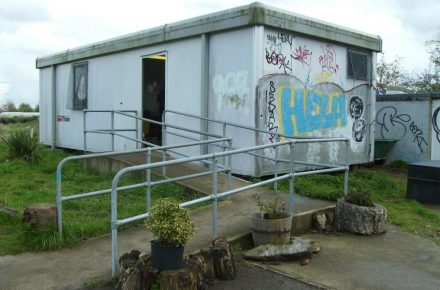
Management’s proposals for improving the student experience as part of its ambitious 2034 plan seem equally poorly conceived, conspicuously dodging the real issue of departments having to teach more students with tightly rationed resources. The ChangeMakers initiative, presumably suggested by The Thick of It’s Nicola Murray, encourages students and staff to partner-up, Bonnie and Clyde-style, “to investigate an educational issue and make improvements or to pilot a change and evaluate it.” Whether students battling deadlines and exam pressure will be willing to put in the effort is yet to be seen.
Another blue-sky idea is the Connected Curriculum, with students learning through research and enquiry rather than taking notes from a lecturer. The aim is to engage students as “partners in their education, and as co-producers of knowledge improving the experiences of both students and staff”, which seems like a laudable ideal. The only problem is, with departments overstretched and academics overworked as it is, nobody has the time or resources to actually implement it. One academic, teaching in the faculty of Life Sciences, told The Cheese Grater that there was already pressure to cut the number of days of fieldwork undertaken by undergrads – seemingly a perfect opportunity for some research-based learning – due to the cost of fieldwork in comparison to learning from a textbook.
Professor Peter Scott, of the UCL Institute of Education, pointed out in a recent Guardian article the inadequacy
of the NSS in reliably judging teaching excellence, writing “All metrics are open to manipulation. But these are especially vulnerable. NSS scores are now ruthlessly “gamed”, because of their impact on league tables.” It’ll take a lot of gaming for UCL to boost their scores, however. Having focussed for so long on research funding and a lucrative international student intake, the government’s proposal to control tuition fees based on student experience now threatens to throttle UCL’s flow of cash. In May UCL faces a review by the Quality Assurance Agency into, among other things, the quality and enhancement of student learning opportunities. Although management are scrabbling to turn the tide, the already stretched resources of departments might mean it’s too little, too late.
The Cheese Grater reached out to UCL for comment on the National Student Survey, and how the College is improving student experience, but didn’t receive a reply at the time of printing.
Jason Murugesu and Bo Franklin
This article appeared in CG Issue 52.

